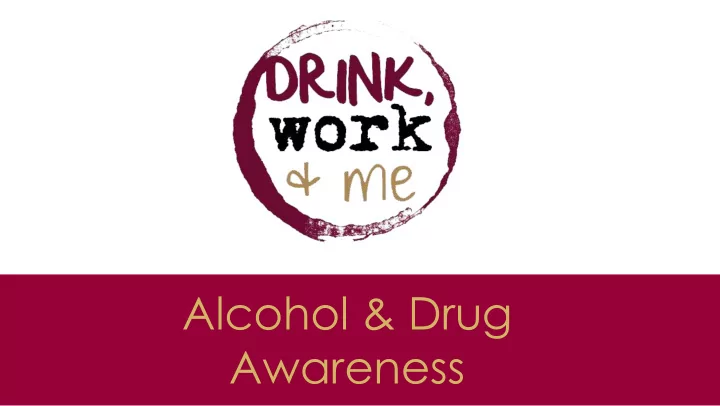

Alcohol & Drug Awareness
Partners Counselling, support and Supporting companies to Providing social research information services for do business in a responsible services to clients in the those affected by alcohol way. not-for-profit sector. and drug use.
Our Aim To reduce harm caused by Alcohol or other Drug use in the workplace
Outcomes To raise awareness of the • risks associated with Alcohol & other Drugs in the Workplace To improve awareness of • current Drug trends in NI To improve Mental & • Physical Wellbeing
ALCOHOL • Processing times • Unit Calculation • Impact on Work
What is a Drug? A chemical substance which when taken into the body alters the physical and/or mental state of the user Depressants Opiates Stimulants Hallucinogens
HARMFUL DRINKERS IN N.I
Who uses alcohol? 6% 53% 74% drink Daily or almost At Least Once alcohol every day Per Week Adult drinking patterns in Northern Ireland 2013; Department of Health, Social Services and Public Safety
What do we drink? 27% 19% 30% 70% 35% 64% Adult drinking patterns in Northern Ireland 2013; Department of Health, Social Services and Public Safety
Understanding Units 2.2 Units 9 Units 1.3 Units 1.5 Units 3 Units
What is Binge Drinking? Roughly, more than 6 units per session for women 8 units per session for men
• Health • Guilt • Taste • Energy • Money • Weight • Confidence • Relationships • Less • Relaxing • Work Productive • Socialising • Criminality • Block out problems • More Money • Urges/Cravings • Improved Health • ‘Missing Out’ • Better Relationships • ‘Fitting in’ • Better in Work • Improved Decision Making
Alcohol: Effect on Mental Health • Alcohol is a central nervous system (CNS) depressant. • Can exacerbate Depression/Anxiety • Disinhibiting effect, suicide attempts more likely • Alcohol can be used as an avoidance strategy • Transgenerational issues (Hidden Harm)
Alcohol: Effects on Physical Health Central nervous system Brain Throat Lungs Gullet Liver Heart Pancreas Stomach Kidneys Intestines Fingers Bones Sex organs
Alcohol: Effects • Impaired vision on Behaviour • Reduced reaction times • Reduced concentration and vigilance • Feeling more relaxed and drowsy, which may cause a driver to fall asleep at the wheel • Difficulty in understanding sensory information • Difficulty doing several tasks at once
Harm Reduction / Abstinence • Don’t buy in rounds • Change the size of your • Drink water in between glass drinks • Be aware of how certain • Use ice in your drinks drinks affect you • Plan a way home • Be aware of processing • Eat food times • Monitor your drinking • It may be that your goal • Have a few drink free days is to abstain. There are • Never drink and drive various supports to help with this, such as AA
Drink Watch App Drink Watch is a FREE app that calculates your units and gives you an estimate of when it is safe to drive
DRUGS • Prescription Drugs • Illicit Drugs • Impact on Work
Prescription Drugs
Prescription Drugs
Illicit Drugs - Considering all drugs used by reporting clients, the most 65% 65% Cannabis commonly reported drug was Cannabis (DMD, 2015) Stated that Cannabis was used 42% 42% as the main drug (DMD, 2015) The most prevalent drugs used by UK employees in a survey 1.93% 93% was Cannabis (Concateno, 2012) Adults aged 16 to 59 claim 6.7% 7% using Cannabis in the last year (Home Office, 2015)
Illicit Drugs - NPS
Polydrug Use
Alcohol & other Drugs in the Workplace Testing Policies Insurance
Help & Support Advice and information Help One to one & and Website counselling Support support Workplace champions
Find us at…. Email: dwmmanager@addictionni.com Address: Lombard House, 10-20 Lombard St, Belfast BT1 1BH Phone: 028 9066 4434 Website: www.addictionni.com Social Media: @addictionni
Recommend
More recommend